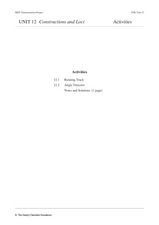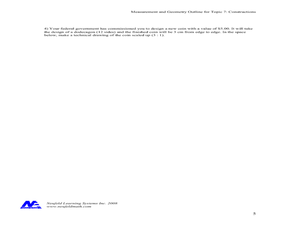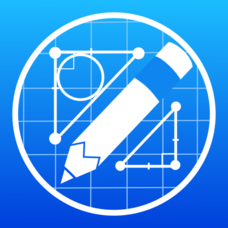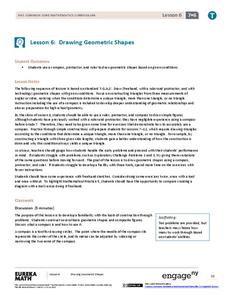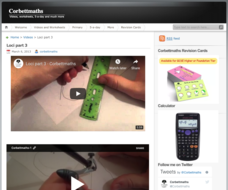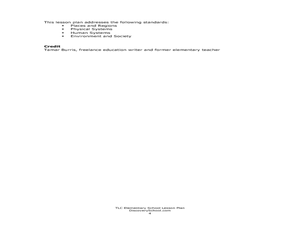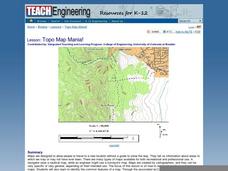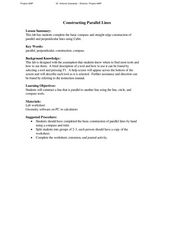EngageNY
Characterize Points on a Perpendicular Bisector
Learn transformations through constructions! Pupils use perpendicular bisectors to understand the movement of a reflection and rotation. They discover that the perpendicular bisector(s) determine the line of reflection and the...
Curated OER
Constructions and Loci
In this geometry worksheet, students construct polygons and calculate the different angles formed by each shape. They construct circles, trapezoids, and rectangles and answer 20 questions.
Curated OER
Constructing Perpendicular Bisectors
Tenth graders investigate parallel lines and the angles formed when cut by a transversal. In this geometry lesson, 10th graders construct perpendicular lines and discuss midpoint, segments and perpendicular bisectors. They relate...
Curated OER
N Equal Parts by Construction
Middle schoolers experiment with straight edges and compasses to divide lengths into equal parts. They identify different fractions of the total length.
Curated OER
Constructing Geometric Shapes
In this construction geometric shapes worksheet, student use the software program for instruction then construction shapes and bisect angles for four questions.
EngageNY
Rectangles Inscribed in Circles
Putting a rectangular object into a circular one—didn't the astronauts on Apollo 13 have to do something like this? Learners first construct the center of a circle using perpendiculars. They then discover how to inscribe a rectangle in a...
Bytes Arithmetic
Geometry Pad+
Graphing paper, pencil, ruler, protractor, and compass, all get replaced or supplemented with this dynamic geometry application. Here, you can create, move, and scale many different shapes, as well as, explore and change their properties...
EngageNY
Looking More Carefully at Parallel Lines
Can you prove it? Making assumptions in geometry is commonplace. This resource requires mathematicians to prove the parallel line postulate through constructions. Learners construct parallel lines with a 180-degree rotation and then...
NOAA
Animals of the Fire Ice
When the sun's rays can't reach the producers in a food web, where does all the energy come from? Extreme environments call for extreme food sources. Young scientists investigate creatures that appear to get their energy from methane...
EngageNY
Special Lines in Triangles (part 1)
Allow your pupils to become the mathematicians! Individuals explore the properties of a midsegment of a triangle through construction and measurement. Once they figure out the properties, learners use them to draw conclusions.
EngageNY
Drawing Geometric Shapes
Learners build confidence working with geometric tools and develop their construction techniques in the sixth lesson plan of the 29-part series. Given a geometric description, they use a compass, protractor, or ruler to create it....
EngageNY
The Angle-Angle (AA) Criterion for Two Triangles to Be Similar
What do you need to prove triangles are similar? Learners answer this question through a construction exploration. Once they establish the criteria, they use the congruence and proportionality properties of similar objects to find...
PHET
Iron Filings and Magnetic Field Lines
How do magnetic fields differ? Allow scholars to see the difference between 2-D and 3-D magnetic fields. They construct models of both and observe how they are similar and different. It is the fifth installment of an 18-part unit.
Curated OER
Construction: Angle Bisector
In this geometry worksheet, young scholars construct angle bisectors of two provided rays using a straightedge and a compass. There are 6 questions.
Curated OER
Constructing Parallel and Perpendicular Lines
For this geometry worksheet, students construct lines that are parallel and perpendicular forming different angles. They differentiate between interior and exterior angles. Students identify the angles formed by a transversal and...
Curated OER
Geometry/Math A Regents Questions: Angle Bisectors
In this angle bisector worksheet, students solve five short answer and multiple choice problems. Students construct angle bisectors using a compass.
Corbett Maths
Loci Part 3
How do you use a scale drawing to find the region in a lake where a treasure is located? The narrator of a short video problem identifies three criteria to determine the location of the treasure. Using a compass and ruler, he determines...
Curated OER
Making Shapes
Tenth graders construct geometric figures using compasses and protractors.
Curated OER
U.S. Geography- The Northeast
Students investigate the geography of the Northeast states. In this map skills instructional activity, students are shown a map of the Northeast states and identify the state names and borders. Students construct individual maps of the...
Curated OER
Motions and Forces
Sixth graders investigate the construction of a magnet and the force it produces. They identify various materials as magnetic or non-magnetic, discuss the properties of magnetic properties, and conduct an experiment with a compass and...
Curated OER
Magnetic Mapping
Pupils draw arrows to show the direction the compass needle is pointing when it is placed around different points of a penny and a bar magnet. Students must then answer questions about the activity on a provided worksheet.
Curated OER
Topo Map Mania!
Seventh graders describe the major features of maps and compasses. They read a topographical map. They take a bearing using a compass. They practice using scales on a map.
Curated OER
Constructing Parallel Lines
Students construct parallel lines using a protractor and a straightedge. In this geometry lesson, students identify the properties of parallel lines. They use Cabri to graph and observe the lines.
Curated OER
Constructing Perpendiculars
Students construct perpendicular lines. In this geometry lesson, students use a compass and straight edge to do construction. They start from a point to a line.

